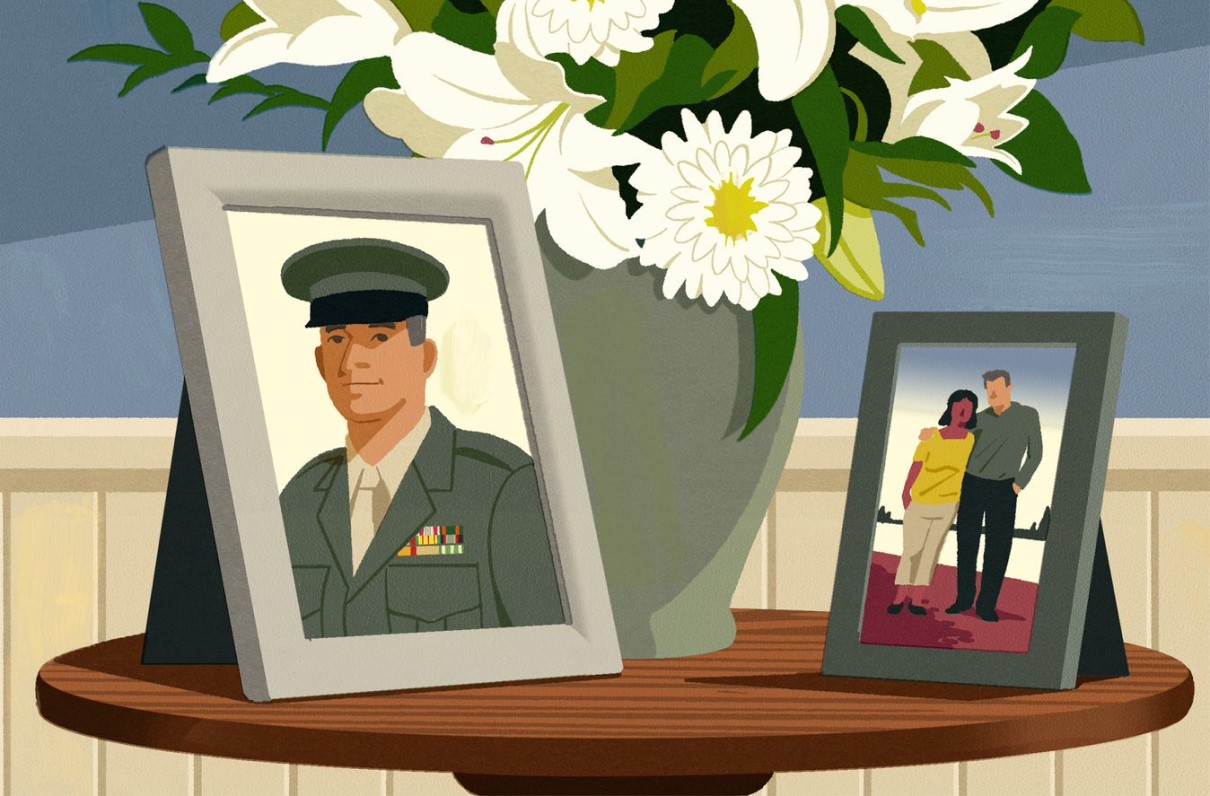(This article by Patricia Kime originally appeared in the April 2023 issue of Military Officer, a magazine available to all MOAA Premium and Life members. Learn more about the magazine here; learn more about joining MOAA here. MOAA members can also save on estate planning solutions with Everplans.)
Proper preparation is the key to ensuring a smooth transition for family members left behind when a military sponsor dies.
Gail Joyce, a surviving spouse liaison for MOAA, recalls hearing about a military officer who obtained a safe deposit box for his family’s important papers — wills, his letter of retirement, birth certificates, passports, and more — but failed to put his wife’s name on it or designate her as a beneficiary. When he died, the situation complicated an already sad, stressful time, with his spouse desperately needing the materials to plan the funeral, sort out finances, and prepare for the future without him. It was a potential disaster, Joyce said.
“Whether it’s a private or a two-star general, there are people who just don’t take care of things,” said Joyce, a Gold Star mother and widow of a Vietnam veteran. She gives talks about preparing for the death of a military sponsor.
[MOAA PUBLICATION: Survivor's Checklist: First Steps for Moving On]
While the loss of any loved one is tragic and heart-wrenching, the death of a military sponsor or veteran spouse can result in financial instability and the loss of health care and other privileges if not handled correctly. But with careful preparation before a death and a pre-planned systematic process after, survivors can weather managing the business side of loss, leaving time to mourn and celebrate a life well lived.
First, Check the Details
According to estate planners, it’s never too late to gather the crucial details needed to help family members in the days and months after a death. The process starts by ensuring that correct names are on every account and asset, with state laws on survivorship helping steer decisions on structuring the names on mortgages, vehicle titles, and financial accounts.
Ensuring that the Defense Finance and Accounting Service (DFAS), the Defense Enrollment Eligibility Reporting System (DEERS), all insurance policies, and any Survivor Benefit Plan (SBP) paperwork have the correct name of the survivor/beneficiary can prevent legal issues from cropping up after a death.
“It’s making sure you have the correct signatures right on everything, on anything that might be of any importance whatsoever,” Joyce said.
[UPDATED MONTHLY: MOAA's Surviving Spouse Corner]
In addition to checking these details, a folder or binder containing every account number, including long- and short-term investments, policies, computer and phone passwords, code words, critical paperwork, and a list of benefits for which survivors might be eligible can be seen as a gift from the grave to loved ones left behind, she said.
“Troubles arise when people don’t do their due diligence beforehand, not taking care of things that are easy to take care of,” Joyce said.

The Death of a Retired Military Sponsor
Once a military sponsor dies, there are numerous calls and contacts to be made, beginning with outreach to a funeral home or planner who assists not only with the arrangements and burial details but also with obtaining death certificates. The next contact should be to DFAS, either by phone or via the DFAS website, notifying the service of the death. Coast Guard survivors can report a death and jump-start the process to receive benefits by calling the Coast Guard Pay and Personnel Center at (866) 772-8724.
DFAS will send a letter containing an SF-1174, Claim for Unpaid Compensation of Deceased Member of the Uniformed Services, as well as annuity account forms and instructions for those enrolled in SBP. Those enrolled in SBP will submit a DD Form 2656-7 with a copy of the death certificate to begin receiving payments.
Beneficiaries should take care not to use any retired payments received after the date of retiree’s death, nor should they return any retired payments that were deposited directly to a bank account, because DFAS will automatically reclaim any money owed it when they receive notification of a death. Widows or widowers of military retirees will retain the same health care benefits they’ve had when their sponsor was alive unless they remarried.
The Defense Manpower Data Center will receive any information from the services on the death and will do any necessary updates for medical coverage. Survivors will need to contact Express Scripts, TRICARE’s pharmacy benefit manager, if their sponsor was on TRICARE Prime or Select, to stop any prescriptions.
[MORE SURVIVING SPOUSE RESOURCES FROM MOAA]
Survivors of military retirees remain eligible for dental and vision insurance unless they get remarried. If enrolled, they should contact BENEFEDS to inform the managers of the change of status, which could reduce the premium given that the deceased beneficiary is no longer a policy holder.
Since military identification cards are the keys to accessing military facilities, such as the commissary, base exchanges, fitness centers and more, survivors should ensure that they have a current ID. Most dependent ID cards have an expiration date, and while it’s not necessary immediately to get a survivor ID card, the task should be completed before the current card expires. This can be done by confirming the sponsor’s death in DEERS and going to the nearest ID card center to receive a new ID. Survivors will need two forms of identification, including at least one government-issued ID such as a passport or driver’s license. Those who live too far from an ID card office but need a new card can find more information at this link.
Regarding Social Security benefits, any funeral home will report the person’s death to the Social Security Administration. Survivors will need to provide the funeral home the deceased’s Social Security number to ensure this occurs. Survivors can do this themselves by calling during business hours. Again, survivors should not use any of the deceased individual’s Social Security payments issued after the date of death as they will be expected to pay the money back.

The Death of an Active Duty Member
The process for pulling paperwork together and dealing with the aftermath of a death is very much the same for families of active duty personnel as it is with retirees, although the families of fallen servicemembers receive great help from a casualty assistance officer. The death of Joyce’s son, Army Sgt. Casey Joyce, killed in Somalia Oct. 30, 1993, was much different than the loss of her husband, Lt. Col. Larry Joyce, of leukemia in 1999, noted Gail Joyce.
“You get a lot of help when you are on that side of things (active duty). But that’s how it should be,” Joyce said.
[THE GOLD STAR: Remembering Our Fallen Servicemembers' Families]
The benefits following an active-duty death are substantially different with a mix of benefits coming from DoD as well as the Department of Veterans Affairs. Surviving spouses receive a death gratuity, SBP, and remain on TRICARE for health and dental care — for the first three years with the same benefits as an active-duty spouse, and as a retiree’s spouse thereafter, unless they remarry. Surviving children are covered as active-duty children for health and dental care until they turn 21, turn 23 as a full-time student, or lose TRICARE eligibility for other reasons.
A substantial amount of pay and benefits for survivors of those on active duty may come from the Department of Veterans Affairs. Through the VA, spouses may receive Dependency and Indemnity Compensation and families may be eligible for additional benefits, including special allowances and education benefits from the VA.
When a Veteran Dies
Benefits are available to surviving spouses or dependent children of military veterans who do not receive military retirement pay, especially if a veteran dies of a service-connected condition or the spouse already receives their health care coverage through the Civilian Health and Medical Program of the Department of Veterans Affairs (CHAMPVA).
Joyce recommends veterans file a claim for any condition they believe is service connected so they can access benefits if the claim is approved but also provide support for their families if the claim is approved following a death from the service-related condition. Spouses should inform the funeral director of their loved one’s status as a veteran. Funeral homes often are helpful aiding families in tracking down burial benefits, insurance, and disability compensation from the VA.
Survivors will need to obtain forms from a VA regional office to begin the notification process. The VA also has a toll-free number to call for help, (800) 827-1000. Families can ward off surprises in a crisis if they plan together ahead of time, Joyce said. Financial distress and gaps in benefits can be avoided if couples plan together for the future — and the dependent spouse has verification that all information is correct in DEERS and with DFAS.
Joyce recalled a helicopter accident several decades ago that left a recently married Army wife without any benefits because her husband had failed to change any of the information on survivorship with DoD. The soldier’s first wife received everything. “The really important thing is just checking,” Joyce said.
Patricia Kime is a reporter covering military health care issues in the Washington, D.C., area.
Military Officer Magazine
Discover more interesting stories in MOAA's award-winning magazine.
